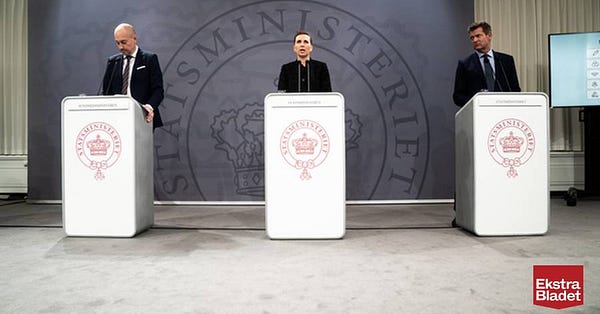Major Danish Newspaper Joins Covid Truth Battle, Apologizes To Readers For Spreading Covid Scare Falsehoods
And In Follow Up Article, Reveals A Report Defying Propaganda About Hospital Collapse, Showing NO INCREASE In Number Of Patients Admitted To Hospitals In December


Text by Brian Weichardt, translated via online translation, published Jan 7, 2022:
For ALMOST two years, we - the press and the population - have been almost hypnotically preoccupied with the authorities' daily corona [Covid] figures.
WE HAVE STARED at the oscillations of the number pendulum when it came to infected, hospitalized and died with corona. And we've got the meaning of the pendulum's smallest movements laid out by experts, politicians and authorities, who have constantly warned us about the dormant corona monster under our beds. A monster just waiting for us to fall asleep so it can strike in the gloom and darkness of the night.
THE CONSTANT mental alertness has worn out tremendously on all of us. That is why we - the press - must also take stock of our own efforts. And we have failed.
WE HAVE NOT been vigilant enough at the garden gate when the authorities were required to answer what it actually meant that people are hospitalized with corona and not because of corona. Because it makes a difference. A big difference. Exactly, the official hospitalization numbers have been shown to be 27 percent higher than the actual figure for how many there are in the hospital, simply because they have corona. We only know that now.
OF COURSE, it is first and foremost the authorities who are responsible for informing the population correctly, accurately and honestly. The figures for how many are sick and died of corona should, for obvious reasons, have been published long ago, so we got the clearest picture of the monster under the bed.
IN ALL, the messages of the authorities and politicians to the people in this historic crisis leave much to be desired. And therefore they lie as they have ridden when parts of the population lose confidence in them.
ANOTHER example: The vaccines are consistently referred to as our 'superweapon'. And our hospitals are called 'super hospitals'. Nevertheless, these super-hospitals are apparently maximally pressured, even though almost the entire population is armed with a super-weapon. Even children have been vaccinated on a huge scale, which has not been done in our neighboring countries.
IN OTHER WORDS, there is something here that does not deserve the term 'super'. Whether it's the vaccines, the hospitals, or a mixture of it all, is every man's bid. But at least the authorities' communication to the population in no way deserves the term 'super'. On the contrary.
—Brian Weichardt
Extrabladet
The other story that just broke about an hour ago, (as far as I can tell,) is this by David Attardo.
Translated here:
At countless corona press conferences, we have been told that it is the fear that the health care system would collapse that was one of the main reasons why we had to shut down parts of the country. Healthcare professionals have undoubtedly worked hard and been under pressure, but a new report shows that the number of people admitted to intensive care did not explode in December compared to previous months. From 1 March to 1 July, there were an average of 266 inpatients admitted to all Danish hospitals. From November 29 to January 3, the number was 280. A difference of 14 patients. In addition, for example, there were 281 inpatients in the country's intensive care units on 31 May. Four days before the latest restrictions were rolled out, the number was 280. The number of covid patients is naturally increasing during the winter months, but on the other hand, intensive care patients with everything else have been a good deal lower than this summer. The report is made by the Regions' Clinical Quality Development Program (RKKP), which takes stock of the situation with corona patients in the country's intensive care units from 1 November to 31 December. A total of 329 were admitted here. You can see data from the regions below: Fewer beds At the same time, data show that the number of hospitalized in intensive care units has been declining since June. The results from the report and the experiences from the hospitals also made the professor and chief physician at the intensive care unit at Rigshospitalet calm down. - It is very unlikely that the omicron variant will give us significant challenges in the intensive care units. We are optimistic and probably also more optimistic than we have dared to be the last few weeks, he says to DR. However, it must be emphasized that hospitals can easily get into trouble in the coming months if they suddenly have too few intensive care units. In addition, it has previously been emphasized how intensive care patients with covid-19 require more resources because they need to be isolated from the other patients.
You can see the full report here.
***
This small periodical in the United States salutes these two sane reporters, at Exstra Bladet, and especially its Editor in Chief, Poul Madsen, who looks like a good and decent man. He’s also a late in life father to a new baby. Exstra Bladet was founded in 1904, and is what Europeans call an evening paper.
Congratulations Mr. Madsen. This courage in the face of tyranny is exactly what the worlds expects of the Danes.
Danish Resistance Armband, photo from The Museum Of Jewish Heritage—A Living Memorial To The Holocaust






You (MSM) fed, cared for and used the monster in your garden… your admission confirms what we already knew. No apology from me for never ever trusting your publications again. Trust betrayed means no more trust.
I never salute rats jumping from a burning ship about to roll over and plunge into the depths.